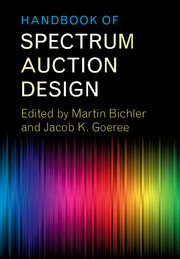Book contents
- Frontmatter
- Contents
- List of Contributors
- Preface
- List of Papers
- Part I The Simultaneous Multiple-Round Auction
- Part II The Combinatorial Clock Auction Designs
- Part III Alternative Auction Designs
- Part IV Experimental Comparisons of Auction Designs
- Part V The Bidders’ Perspective
- 31 Winning Play in Spectrum Auctions
- 32 Up in the Air: GTE's Experience in the MTA Auction for Personal Communication Services Licenses
- 33 Bidding Complexities in the Combinatorial Clock Auction
- 34 Strategic Bidding in Combinatorial Clock Auctions – A Bidder Perspective
- 35 Impact of Budget Constraints on the Efficiency of Multi-lot Spectrum Auctions
- Part VI Secondary Markets and Exchanges
- Outlook
- References
33 - Bidding Complexities in the Combinatorial Clock Auction
from Part V - The Bidders’ Perspective
Published online by Cambridge University Press: 26 October 2017
- Frontmatter
- Contents
- List of Contributors
- Preface
- List of Papers
- Part I The Simultaneous Multiple-Round Auction
- Part II The Combinatorial Clock Auction Designs
- Part III Alternative Auction Designs
- Part IV Experimental Comparisons of Auction Designs
- Part V The Bidders’ Perspective
- 31 Winning Play in Spectrum Auctions
- 32 Up in the Air: GTE's Experience in the MTA Auction for Personal Communication Services Licenses
- 33 Bidding Complexities in the Combinatorial Clock Auction
- 34 Strategic Bidding in Combinatorial Clock Auctions – A Bidder Perspective
- 35 Impact of Budget Constraints on the Efficiency of Multi-lot Spectrum Auctions
- Part VI Secondary Markets and Exchanges
- Outlook
- References
Summary
Introduction
The Combinatorial Clock Auction (CCA) is an innovative auction design that has been used in many recent auctions of spectrum for telecommunication use. The CCA is based on ideas from modern microeconomic theory and combines package bidding with dynamic price discovery in a two-stage design.
In the clock phase, bidders express their demands at increasing prices in each of the auctioned categories of spectrum lots until the indicated demand matches the available supply. In the supplementary phase, bidders can improve their bids from the clock phase and submit additional bids for other desired combinations of lots. To induce truthful bidding in the clock phase, bids in the supplementary phase are constrained by a cap that is based on the clock bids. To determine winnings and prices all bids of a particular bidder are treated as mutually exclusive package bids and the combination of packages that maximizes the value as expressed by the bids is the winning allocation. The prices are determined through (a variant of) the Vickrey (second-price) rule by calculating the opportunity cost imposed by each bidder on her competitors. In general, there exist many more additional details like reserve prices, caps, or activity rules that have to be considered when designing a CCA.
While the design is quite complex, the promise of the CCA is that bidding is simple. Regulators argue that in a CCA truthful bidding is close to optimal independent of the bidding strategy of the competitors. Regulators claim that the CCA “allows bidders to use a simple strategy” and “allows the participants to evaluate the spectrum without […] shadow bids.” If truthful bidding is indeed close to optimal independent of the competitors’ behavior, this would be useful for the participants. In this case there is no need for strategizing and bidders could simply quote on the packages that lead to largest profit in the clock phase. In particular, bidders could focus their resources on determining the correct valuations and would not need to worry about the preferences of the competitors or their potentially erratic or spiteful behavior.
Information
- Type
- Chapter
- Information
- Handbook of Spectrum Auction Design , pp. 731 - 747Publisher: Cambridge University PressPrint publication year: 2017
References
Accessibility standard: Unknown
Why this information is here
This section outlines the accessibility features of this content - including support for screen readers, full keyboard navigation and high-contrast display options. This may not be relevant for you.Accessibility Information
- 1
- Cited by
